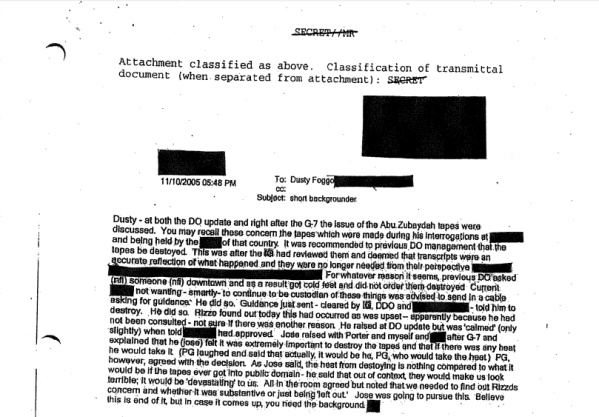Unredacted (blog), The National Security Archive, George Washington University. Compares Gina Haspel’s confirmation hearing testimony with the declassified record. Disputes Haspel’s claim that CIA has “historically not done interrogations.”
The 1963 Kubark manual.
Fact-Checking Haspel’s Nomination Hearing Against the Declassified Record
PolitiFact reached out to the National Security Archive’s CIA expert John Prados to help fact-check key claims Gina Haspel made during her contentious nomination hearing to lead the agency.
Among the claims Prados debunked was Haspel’s assertion that the “CIA has historically not done interrogations.”
The executive summary of the Senate Intelligence Committee’s study on the CIA’s detention and interrogation program contradicts this when it specifically cites a 1963 CIA manual called the Kubark Counterintelligence Interrogation Manual. Kubark “included the ‘principal coercive techniques of interrogation: arrest, detention, deprivation of sensory stimuli through solitary confinement or similar methods, threats and fear, debility, pain, heightened suggestibility and hypnosis, narcosis and induced regression.’” Prados argues “It is poor history to say that the CIA never did interrogations. The manual cited in the Senate report was created for that purpose.”
Prados also highlights the case of “Soviet defector Yuri Nosenko, who was interrogated for several years at the hands of the CIA. Nosenko was handled ‘abusively enough’ that the agency would later give him a cash payment.”
PolitiFact also cites the Archive regarding Haspel’s exceedingly dubious claim that the 92 video recordings showing CIA personnel waterboarding detainees were destroyed to avoid a “security risk” to agents’ safety. But safety was not mentioned by the CIA at the time of the destruction. A declassified 2005 CIA email released to the National Security Archive shows the CIA thought “The heat from destoying [sic] is nothing compared to what it would be if the tapes ever got into the public domain.” There is no mention of security risks.

“the heat from destoying [sic] is nothing compared to what it would be if the tapes ever got into the public domain.”
Classification and redactions still cover key questions of Gina Haspel’s torture story. Among them are: whether she was still the chief of base when the Green site closed on December 4, 2002; did she supervise the November 27, 2002, waterboarding sessions of Al Nashiri; and did she ever object to the torture, or express any qualms?
An excellent collection and analysis of what is available can be found in a recent Archive posting.
More resources from the National Security Archive on the history of the CIA’s torture program and other activities can be found here:
- The CIA Black Sites Program and the Gina Haspel Nomination
- National Security Archive Sues CIA for Gina Haspel Torture Cables
- Gina Haspel’s CIA Torture File
- Torture Report Finally Released
- The Central Intelligence Agency’s 9/11 File
- The Zelikow Memo: Internal Critique of Bush Torture Memos Declassified
- CIA Inspector General Report Exposes Torture as U.S. Policy
- CIA IG torture report – what were they hiding?
- The CIA’s Family Jewels
CIA Email Accounts Designated for Permanent Preservation
The U.S. National Archives recently approved the CIA’s Capstone email preservation schedule that will capture and preserve more than 426 CIA email accounts as permanent. The plan is a welcome change of pace from the agency’s more recent attempt to only preserve the emails of 22 senior agency officials. Public outcry eventually forced the CIA to withdraw the plan in 2016.
Of note for curious researchers: the agency’s NARA-approved plan states, “Traditional records management with a print-and-file policy was in place prior to the Capstone adoption. The Central Intelligence Agency has legacy classified and unclassified email for Capstone and Non-Capstone officials that will be dispositioned with this schedule. The Agency has classified email dating back to approximately 1995. The archive for email sent and received on the Agency’s unclassified network was deployed in December 2014. Searches of the unclassified archive have returned emails dating as far back as 2007.” (emphasis added)
EPA Political Aides take Aggressive Role in FOIA Reviews
A FOIA release from the Environmental Protection Agency to the Natural Resources Defense Council reveals an agency whose political aides are interceding in the FOIA review process for requests concerning EPA head Scott Pruitt beyond the norm. The released emails show “Pruitt’s aides chastising career employees who released documents about the administrator without letting them screen the records first. Meanwhile, several environmental groups say the agency has told them that political staffers’ document reviews have delayed releases past legal deadlines.” The Archive’s Nate Jones says the EPA’s current process “does look like the most burdensome review process that I’ve seen documented.”
The documents also show Pruitt’s chief of staff, Ryan Jackson, created a pilot program that was nominally intended to “centralize” FOIA requests that are processed by the Office of the Administrator’s sub-offices, but is practically intended to alert the political staff “about any requests anywhere at EPA that involved Pruitt.”
NRDC obtained the emails after filing a FOIA lawsuit.
Other EPA/Scott Pruitt FOIA news from the past few months that is worth highlighting:
- Scott Pruitt has 4 EPA Emails – 3 Don’t Follow the EPA’s Conventional Format
- EPA Removes FOIA-Released Documents from Online Portal after Critical News Coverage
- Scott Pruitt’s Superfund Secrecy
- Pruitt’s Phantom Death Threats?
- POGO finds EPA “has been especially slow to resolve information requests directed specifically at Pruitt’s office.”
- Scott Pruitt’s Expensive Carbon Footprint
- Scott Pruitt’s Role in EPA Document Scrub
h/t stephenliss
